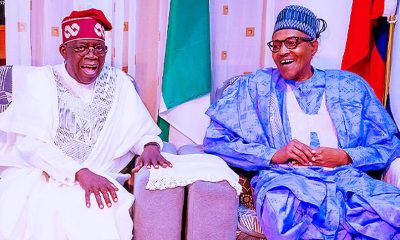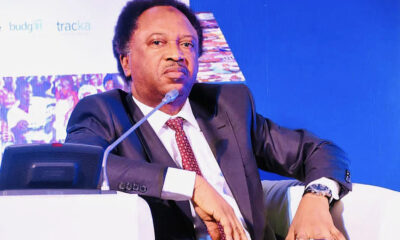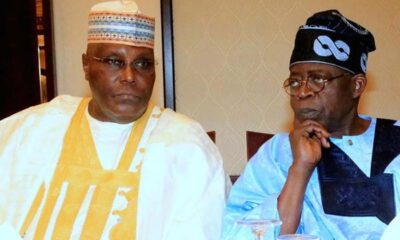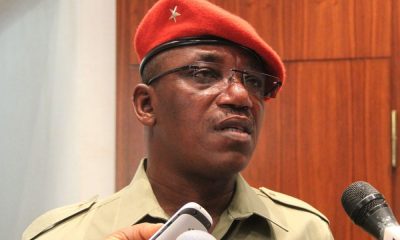News
Buhari appoints rector for Federal Polytechnic, Offa

Buhari appoints rector for Federal Polytechnic, Offa
President Muhammadu Buhari has approved the appointment of Dr Kamoru Kadiri as the 5th substantive Rector of the Federal Polytechnic, Offa in Kwara.
The News Agency of Nigeria (NAN) reports that the institution’s Director of Information, Public Relations and Protocol, Mr Olayinka Iroye, confirmed this in a statement on Monday in Offa.
He said the appointment letter was signed and personally handed over to Kadiri by the Minister of Education, Malam Adamu Adamu, in his office on Monday with effect from March.
NAN reports that the appointment is a five-year single term.
Until his appointment, Kadiri was the Director of Affiliate Degree Programmes and Industrial Collaborations and later appointed Ag. Rector of the Polytechnic Iresi, Osun State, on a one-year sabbatical in 2021.
READ ALSO:
- Police Rescue Kidnapped Trader In Osun
- Exam malpractices: Soludo shuts school, fires teacher
- Protesters ground INEC headquarters, warn US, UK, others against promoting insurrection in Nigeria
He was born on July 8, 1968, in Osogbo. He attended Ansarudeen Primary School, Isale Osun, Osogbo, and enrolled at the St Charles’ Grammar School, Osogbo, in 1985.
He began his Engineering career at The Polytechnic Ibadan, where he obtained his National Diploma in Electrical Electronics Engineering in 1988.
He proceeded to Obafemi Awolowo University, Ile-Ife, for his B.Sc in Electrical/Electronics Engineering.
Kadiri also possessed three Master Degrees, (MBA University of Ado Ekiti, MILR University of Ilorin, and M.Sc from Babcock University) and a Doctoral Degree (PhD) with a specialisation in Networking and Telecommunications also from Babcock University.
He was at the University of Groningen, Netherlands, for bench work where he was exposed to state-of-art equipment to complete his Ph.D. thesis.
Kadiri joined the services of The Federal Polytechnic Offa in November 1996 and rose through the ranks to become a Chief Lecturer.
He was a former Head of the Department of Electrical/Electronics Engineering and former Chairman of the Academic Staff Union of Polytechnics (ASUP), FEDPOFFA Chapter.
The new Rector is a Registered Engineer and a FeIlow, Institute of Data Processing Management of Nigeria; Fellow, the Nigerian Society of Engineers; Member, the Nigerian Institute of Management (AMNIM).
Similarly, Kadiri is a member, Nigerian Institute of Engineering Management (NIEM); member, Engineering Regulation Bureau and Legislation Board of Nigerian Society of Engineers, and Fellow, Nigerian Institute of Electrical and Electronics Engineers.
He is an accomplished scholar who has contributed to knowledge and research with over 50 published journals, 17 published refereed conference proceedings, 25 seminar papers, and 20 single-authored textbooks in various fields of Engineering.
Kadiri has two patented inventions and 11 literary works with the Copyright Commission of Nigeria.
He had won research grants twice from Tertiary Education Trust Fund (TETFund) and Clintonnel Innovation Centre.
He is happily married and blessed with children.
Buhari appoints rector for Federal Polytechnic, Offa
NAN
News
Currency in circulation now N4.8tn – CBN report
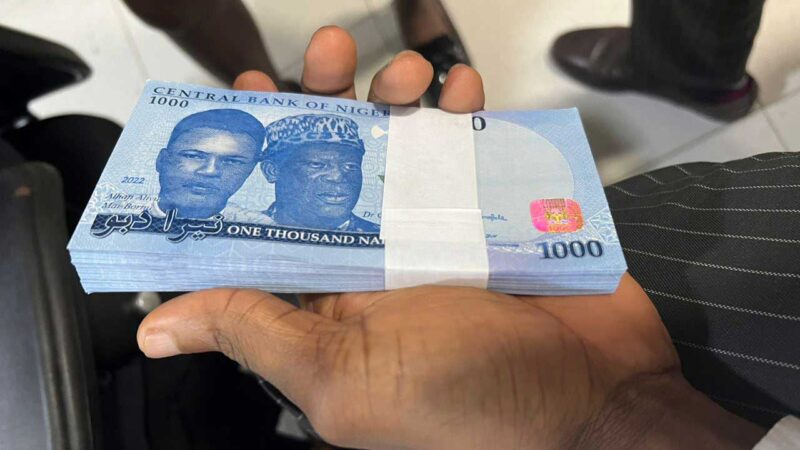
Currency in circulation now N4.8tn – CBN report
Currency in circulation has reached an all-time high of N4.8 trillion as of November 2024, recording over seven per cent increase from the previous month.
Also, currency outside banks grew significantly in the same month hitting an all-time high of N4.6 trillion from the N4.2 trillion in the month of October.
These figures were contained in the money and credit supply data from the Central Bank of Nigeria (CBN).
The currency in circulation is the amount of cash–in the form of paper notes or coins–within a country that is physically used to conduct transactions between consumers and businesses.
It represents the money that has been issued by the country’s monetary authority, minus cash that has been removed from the system.
Similarly, currency outside a bank refers to cash held by individuals, businesses and other entities that is not stored in banks.
The currency outside the bank represents about 96 per cent of the currency in circulation.
Nigerians have in recent times been facing acute cash shortage with banks limiting daily withdrawal at Automated Teller Machines (ATMs) to N20,000 irrespective of the number of accounts held by an account owner.
READ ALSO:
- Cross River man kills mother, dumps body inside well
- El-Rufai mocks Reno Omokri with throwback protest photos against Tinubu
- Warri refinery: Marketers hopeful of further petrol price drop
According to the latest data, the currency in circulation grew by seven per cent to reach 4,878,125.22 from 4,549,217.51 in October.
Currency in circulation has grown steadily in the outgoing year 2024 with over one trillion naira added to cash in circulation after starting the year with N3.65 trillion in January.
In February, the currency in circulation slightly increased to N3.69 trillion representing an increase of N43 billion or 1.18 per cent from the January figure.
March also saw an appreciable increase to N3.87 trillion while it further increased to N3.92 trillion in the following month of April.
The growth trajectory continued in May with the currency in circulation increasing slightly to N3.97 trillion, an increase of N42 billion or 1.07 per cent while it reached an all-time high of 4.04 trillion, an increase of 2.11 per cent from May.
The July figure also rose marginally with the currency in circulation settling for N4.05 trillion before growing to N4.14 trillion in August and N4.43 trillion in September and N4.5 trillion in October.
In the same vein, currency outside banks grew from N4.2 trillion in October to N4.6 trillion in November, showing increasing preference for other means of storing outside bank deposits.
Economist, Dr. Paul Alaje attributed the development to the expanding money supply, adding, “Money supply is expanding but this may not necessarily be in cash. As it is expanding, it will necessarily induce inflation. But you can’t blame the people. People must look for money. How much was bottled water last year, how much is it today? All of this will induce inflation. If you now ask, what is the cause of inflation? Is it money supply itself or a devaluation policy? It is a devaluation policy. Money supply is an offshoot. So the Central Bank is raising interest rates to actually reduce money supply but the more they try the more money supply expands.”
He stated that the floatation policy of the CBN has created inflation, adding, “It is like chasing one’s tail and I don’t know if you are going to catch it.”
Currency in circulation now N4.8tn – CBN report
News
Tinubu not telling Nigerians the truth, says Sule Lamido

Tinubu not telling Nigerians the truth, says Sule Lamido
President Bola Tinubu has been accused of not being forthright about the true state of Nigeria under his administration.
Former Jigawa State Governor and senior Peoples Democratic Party (PDP) member, Sule Lamido, made the accusation while speaking on the BBC Hausa programme Gane Mini Hanya.
Lamido criticized both Tinubu and former President Muhammadu Buhari for what he described as a lack of transparency in governance.
“Buhari’s and Tinubu’s governments are not being transparent with Nigerians unlike during the time when PDP was in power where everything was transparent and open to all Nigerians,” Lamido said.
READ ALSO:
- Odili: Fubara prevented Wike from turning Rivers to private estate
- Putin apologises over Azerbaijan plane crash reportedly shot down
- 256 terrorists, two logistics suppliers arrested in one week – DHQ
He accused the two administrations of relying on propaganda rather than providing citizens with accurate information.
Lamido also expressed concerns over President Tinubu’s recent loan requests, questioning the logic behind them. “If Nigerians are being told the truth then there is nothing wrong with that, but how would you budget N30tn, generate N50tn and then request loan when you have a surplus of N20tn,” he said, referencing last year’s budget.
He described the situation as “reckless” and “selfish,” adding, “This recklessness and clear-cut selfishness is not done anywhere in the world, but yet you find (some) Nigerians supporting it. Visit social media and see how APC is being criticised, being referred to as calamity, yet you find some protecting it.”
Tinubu not telling Nigerians the truth, says Sule Lamido
News
Nigeria Customs Service begins 2025 recruitment [How to apply]

Nigeria Customs Service begins 2025 recruitment [How to apply]
The Nigeria Customs Service (NCS) has announced the commencement of its recruitment exercise, assuring Nigerians that the process is entirely free and fair.
The agency has cautioned the public to be vigilant against scammers who may attempt to exploit unsuspecting applicants during the recruitment period.
Applications are invited for positions in the Superintendent, Inspector, and Customs Assistant cadres as part of the Service’s plan to recruit 3,927 officers in 2025.
This initiative is aimed at enhancing trade facilitation and supporting Nigeria’s economic recovery efforts.
“Our recruitment is entirely free and fair. At no stage do we charge fees. Anyone requesting payment is a scammer,” the agency emphasized, urging applicants to be wary of fraudulent schemes.
READ ALSO:
- Dangote, Tinubu, Lookman, Badenoch named among 100 most influential Africans in 2024
- Heavy security in Ilesa as ex-Osun deputy gov emerges new Owa-Obokun
- Hacker has stolen N180m from my NGO account – VeryDarkMan cries out
The NCS outlined eligibility criteria, stating that applicants must be Nigerian citizens by birth, possess a valid National Identification Number (NIN), and have no criminal record or ongoing investigations.
Academic qualifications for the three cadres are as follows:
Superintendent Cadre: A university degree or Higher National Diploma (HND) along with an NYSC discharge or exemption certificate.
Inspectorate Cadre: A National Diploma (ND) or Nigeria Certificate in Education (NCE) from an accredited institution.
Customs Assistant Cadre: At least an O’Level certificate (WAEC or NECO).
In addition to these qualifications, the NCS stressed that all applicants must be physically and mentally fit, providing evidence of medical fitness from a recognized government hospital.
Nigeria Customs Service begins 2025 recruitment [How to apply]
-

 Politics3 days ago
Politics3 days agoGbajabiamila speaks on his rumoured Lagos governorship ambition
-

 metro3 days ago
metro3 days agoFarotimi to pursue disbarment over arrest, defamation allegations
-

 Business2 days ago
Business2 days agoReal reason Dangote, NNPC drop petrol price — IPMAN
-

 Health2 days ago
Health2 days agoABU Teaching Hospital will begin kidney transplant in 2025 – CMD
-

 Sports1 day ago
Sports1 day agoAnthony Joshua prostrates before Governor Abiodun during Ogun visit
-

 metro3 days ago
metro3 days agoEl-Rufai accuses Tinubu govt of Yoruba agenda, Reno Omokri reacts
-

 metro3 days ago
metro3 days agoNigerian govt urged to intervene in Mozambique post-election violence
-

 metro3 days ago
metro3 days agoAdeleke presents staff of office to new Owa-Obokun amid protest



